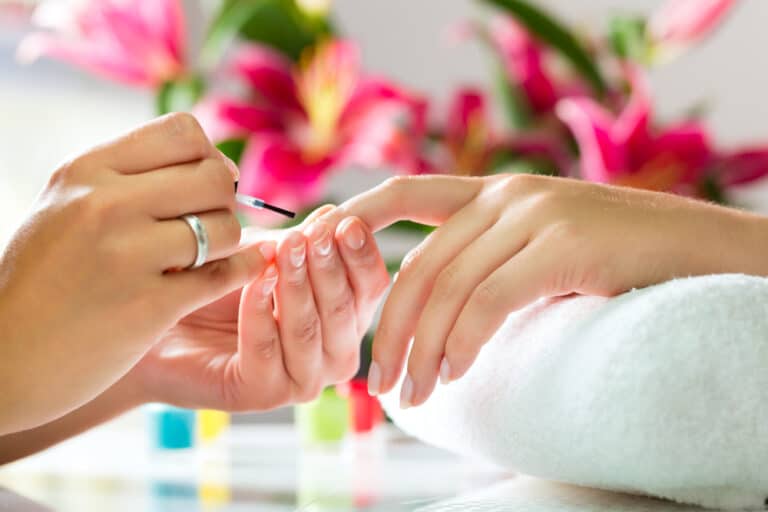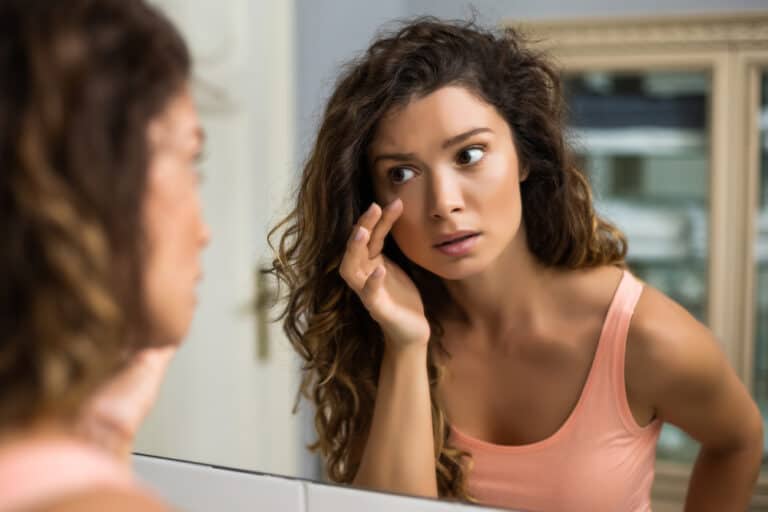Is Nail Glue Bad For Your Nails? (Explained)

You love your press-on nails, but you are worried about your nail health.
Press-on nails can look great, but they do require nail glue for their application.
Nail glue is made up of a variety of chemicals.
In this article, we will walk you through everything you need to know about using nail glue and the impact it might have on your nail health.
Is Nail Glue Bad for Your Nails?

Yes, nail glue can be bad for your nails.
Nail glue is made up of some harsh chemicals.
Prolonged use of it can damage or weaken your nails.
You are going to need to watch out, especially if you have a sensitivity to nail glue.
This doesn’t mean you need to avoid nail glue entirely.
If you properly apply and remove your press-on nails, you can avoid a lot of damage associated with gluing on false nails.
Also, using nail glue with press-ons can be a lot healthier than getting a set of acrylic nails.
If you want the false nail look without the damage, you can also use alternatives like nail adhesive tape.
How Do I Keep My Nails Healthy While Using Nail Glue?

If you want to continue using nail glue but also want to make sure your nails stay healthy, there are a few things you can do.
1. Break It Up
The best thing you can do to keep your nails healthy while using nail glue is to give them a break every once and a while.
If you can, try to limit using press-on nails to special occasions only.
If you want to use them on a regular basis, consider giving your nails a regular break as well.
2. Nail Supplements
If you want to use press-on nails all the time but want to keep your nails healthy, it’s important to make sure you are getting all of the vitamins and minerals you need for nail growth.
Taking nail supplements can be one way to ensure you are giving your nails everything they need to stay strong in the face of regular nail glue usage.
What If I Get Nail Glue on Other Parts of My Body?

If you get nail glue on other parts of your body, you are going to want to remove it as quickly as possible.
If it is somewhere that is not too sensitive like your hand or leg, you can probably just take it off with acetone.
However, if you get it on your eyes, eyelids, or lips, do not apply acetone.
Instead, soak the area with warm water and immediately go to see a doctor.
What If I Get Nail Glue in My Mouth?
If you accidentally consume some nail glue, call poison control immediately and head to the doctor.
What Alternatives to Nail Glue Are There?

If you want to use press-on nails regularly but don’t want to suffer the negative effects associated with nail glue, you can always consider using nail tape.
Adhesive tape is gentler on your fingernail.
If adhesive tape has fewer chemicals and fewer negative effects, why doesn’t everyone use it?
The truth is nail tape has a pretty short staying power.
Nails secured with nail tape typically last just a few days.
By comparison, if you attach your press-on nails properly with a high-quality nail glue, they can last for up to two weeks.
Even though it might seem like a pain to have your press-ons last such a short amount of time, you can also view this as an opportunity.
Using nail tape will allow you to change your look more often.
If you love press-on nails, maybe you’d love it even more if you had the chance to match your nails with every outfit.
How Can I Remove My Nail Glue?

Are you ready to give your nails a break from nail glue?
The first thing you are going to want to do is to get some nail polish remover.
You are going to specifically need one that contains acetone, as this is the active ingredient that will dissolve the nail glue.
Step 1: Soak Your Fingers
Soaking your fingers in warm, soapy water will help to loosen up the nail glue.
It is best to make the water as warm as you can while making sure that it is still comfortable.
There’s no need to burn yourself!
The warmer the water is, though, the better it will loosen the nail.
Step 2: Apply Acetone
Once you have soaked your nails, you can go ahead and apply acetone.
The best way to do this would be to immerse your nails completely in the acetone.
This allows the acetone to get between the press-on and the nail.
The purpose is to dissolve the nail glue, so you want to make sure you are getting the acetone in this area.
If soaking the nail isn’t an option for you, you can apply acetone to a cotton ball or cotton swab.
Then you can wrap it around your nail and let it sit for a while.
This is a way to soak your nail without wasting acetone.
Step 3: Remove the Nail
Once the nail is adequately loosened, you can remove it from your finger.
Be careful, though!
If you are feeling resistance, don’t use extra force.
Instead, go back to soaking in the acetone until the nail comes off with very little resistance.
You want to make sure that you aren’t damaging your real nail by ripping off the press-on.
Step 4: Clean It Up
Once you have all your nails off, take a cotton swab with acetone on it and swipe over each nail.
Scrub off any remaining nail glue.
After all, it’s not the press-on nails that are a risk for your nail health.
It’s the glue itself!
Step 5: Moisturize
It is important to moisturize after removing your press-on nails.
Acetone is drying to the skin and the nails.
You can use any moisturizer you want.
The best type of moisturizer for this situation, though, would likely be something oil based.
Oil-based moisturizers have the added benefit of removing any remaining nail glue.
You can use a household staple like olive oil to moisturize.
Another option would be to use petroleum jelly.
Maybe It’s Not Your Nail Glue

If you notice that your nails are getting irritated after your manicures, it might not be the fault of your nail glue.
There are other factors that might be damaging your nails and causing health issues.
Before you assume it is all because of the glue, consider these other causes of nail problems:
1. Cuticle Trimming
That is right, cuticle trimming can actually be unhealthy.
This is especially true if you do it in excess.
Cuticles play an important role in keeping your hands and nails healthy.
They protect your nails and skin from infections.
Solution: If you want to use nail glue but are worried about the health of your nails, consider skipping the cuticle trimming next time you get a manicure.
2. UV Light
UV light is used to cure gel nails and gel polish.
However, it also contains radiation that can damage your skin.
There are a few things you can do to prevent yourself from UV exposure.
Solution: Firstly, if you are wearing press-on nails that are painted with gel polish, consider painting the nails before you put them on your finger.
By curing the faux nails under UV light, you get the same look while avoiding unnecessary exposure to UV light.
Secondly, if you must apply the polish while your nails are already glued into place, you can use an LED curing light instead.
Not every salon is going to have these, so it’s probably best to check ahead of time to see if you can find one that does.
3. Green Nail Syndrome
If your nails turn green after wearing press-ons, you might assume it is because of your nail glue.
In reality, though, it is almost certain this is caused by “green nail syndrome.”
Green nail syndrome is a bacterial infection that affects the nail plate.
The discoloration is caused by a material that the bacteria secretes.
It’s a pretty common effect of false nails.
The good news is that there is a solution.
There are also some things you can do to prevent it from occurring in the first place.
Prevention: Make you your faux nails are properly sized.
This infection is normally caused by moisture.
If your faux nail is too large, moisture could get underneath it.
When you apply your nails, you are going to want to clean the nail bed with rubbing alcohol first.
This kills any bacteria that might be on your nail.
Use rubbing alcohol to disinfect any tools you are going to use while applying your press-on nails.
Wash your hands with soap and water before applying them.
After you apply the nail, make sure not to get your hands wet for at least two hours.
Press down firmly on the nail to make sure the glue adheres fully.
Make sure that your nail techs are experienced and keep a clean nail studio.
Always dry your hands completely before applying the nail.
Avoid buffing the nail before application.
Filing or buffing your nail bed could create micro-tears.
While this might help the nail glue last longer, it also allows bacteria to settle into the nail.
Pick a High-Quality Nail Glue

You can prevent many problems from arising if you simply spend the money on high-quality nail glue.
There are some things you should keep in mind when searching for a good nail glue.
1. Never Use Super Glue!
Maybe you already have some super glue on hand and are thinking about using it to attach your press-on nails.
After all, super glue is super strong, right?
Using super glue instead of nail glue is a huge mistake.
Super glue was not made for use on your body.
It has harsh chemicals in it that will damage your nails more than nail glue would.
2. Use a Reputable Brand
Using a main-stream nail glue brand is a great way to protect your nails.
For example, if you live somewhere without strong regulations on beauty products, you might want to choose a brand that makes products for international markets.
Brands that are sold in Western European countries are probably a safe bet.
If you are buying your product online, make sure you recognize the brand.
3. Do Your Research
If you are very concerned about your nail health, it is good to do your research about the nail glue you are considering buying.
Search the name of the nail glue along with the phrase “health effects.”
Make sure to read the reviews on it.
4. Talk to a Nail Tech
Even if you DIY your manicures, it can be worth talking to a nail tech about the best option for nail glue.
After all, they are professionals.
It is their job to be informed about the best nail products out there.
Should I Use Nail Glue with Press-Ons or Acrylic Nails?

If you know you are going to have false nails, using nail glue is a healthier choice than getting a set of acrylic nails.
In fact, it is a very healthy option if you are switching to nail glue to give your nails a break from acrylics.
Nail Glue vs. Acrylic Nails

While nail glue is still made up of chemicals that can affect your nail health, it is probably better for you than acrylic nails.
Acrylic nail application also involves lots of chemicals.
The damage that acrylic nails do to your fingers isn’t just limited to the adhesive, though.
The acrylics themselves are made out of chemicals.
Additionally, you have to shave down the top of the nail to make sure the adhesive adheres properly to your finger.
Another reason acrylic nails can damage your fingers more than nail glue is their sheer weight.
Acrylic nails tend to be significantly heavier than press-on nails.
This means they are constantly straining your nails.
Your nails weren’t made to hold extra weight—especially not after they have been weakened by the acrylic application process.
What Can I Do to Promote Nail Health?

The best thing you can do for your nail health is to keep them completely natural.
Avoiding any false nail products, polish, or nail polish remover is always going to be the best option for your nails.
If you do want to use beauty products on your nails, consider taking a daily nail-growth vitamin, or adjust your diet to make sure you are getting the vitamins needed for your nails.
The most important vitamins to consume for nail growth include biotin, B vitamins, and iron.
Some good sources of these vitamins include eggs, salmon, and dark leafy greens.
You can also use base coats that promote nail growth.
You will have to use these when you are just painting your nails, however, and won’t be able to use them alongside false nails.






